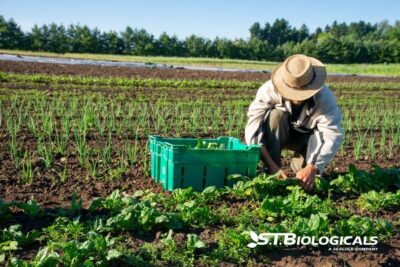According to the National Weather Service, it’s going to be a dry 2025, and that will only exacerbate any micronutrient deficiencies. Let’s take a closer look at the micronutrient deficiencies you can expect in dry conditions later this growing season.
Common Micronutrient Deficiencies Found Late Season in Row Crops
Micronutrient needs for good grain fill and an optimum nutritional profile vary by crop and stage of growth. The three main row crops grown in the Midwest and High Plains are corn, soybeans, and wheat. Deficiencies in necessary micronutrients will result in decreased grain fill and less disease resistance.
Corn
In July, corn is typically in the late vegetative (V10-VT) to early reproductive (R1-R3) stages, depending on planting dates. Regional conditions also impact how well the crop is performing.
At this time, corn is a heavy feeder of NPK, and the availability of micronutrients is critical for pollination and kernel development. The micronutrients zinc, boron, and manganese are necessary for stalk strength and drought resilience.
When corn starts tasseling & silking (VT-R1), the plant kicks into high stress mode. Any deficiency in boron, zinc, or sulfur will reduce kernel set and ear size. For a well-filled ear of corn (R2-R3) with good starch content and disease resistance, the micronutrients copper and manganese must be present.
Soybeans
For soybeans, July is when the crop is in the reproductive stages (R1-R4), focused on flowering, pod development, and early seed formation. Micronutrient deficiencies at this time seriously affect the profitability of your farm. Iron and manganese are needed for the last sprint of photosynthesis and chlorophyll production. Without these micronutrients, soybean leaves will exhibit interveinal chlorosis, especially in high-pH soils.
Boron, zinc, and copper are needed in small amounts for flowering, pod set, and seed development. Deficiencies will result in reduced pod numbers, poor pollination, and smaller seeds. The seeds you do get will have lower protein content so will have a lower market value. Micronutrients have an outsized economic impact on your bottom line.
Although not technically micronutrients, potassium and sulfur deficiencies are soybean limiting factors in July, and without them, water regulation, stress tolerance, and nodulation all suffer.
Wheat
Wheat is in the grain-filling & maturation stages in July. Micronutrient dynamics are crucial for grain development, protein synthesis, and stress resilience. At this stage, copper is required for enzyme activity and disease resistance. Manganese and zinc are needed for photosynthesis and carbohydrate metabolism. Deficiencies in manganese and zinc can lead to premature senescence as leaves yellow and photosynthesis decreases.
Boron, one of the most widespread micronutrient deficiencies, seriously impacts poor grain development because it influences pollen viability and grain set.
Any deficiencies will be magnified if this year’s drought predictions come to pass.
How Does Drought Impact Micronutrient Deficiencies?
With the predicted warmer-than-normal temperatures and below-average precipitation for most of the Midwest and Great Plains, crops will take a beating.
Drought conditions significantly impact micronutrient availability in corn, soybeans, and wheat by reducing soil moisture, which limits nutrient mobility and uptake. In corn, deficiencies in zinc, boron, and potassium become more pronounced, affecting grain fill and stalk strength.
Soybeans often struggle with iron and manganese shortages, leading to chlorosis and reduced pod development. Wheat faces copper and boron deficiencies, which can weaken grain formation and disease resistance.
Additionally, drought disrupts microbial activity, further reducing nutrient availability and exacerbating plant stress. Without sufficient moisture, plants struggle to absorb essential micronutrients, leading to yield loss and poor crop resilience.
At ST Biologicals, we work with farmers and ranchers across the nation to adapt to changing weather conditions. Regenerative agricultural practices create greater resilience for better yields, plant health, and soil health. To find out how you can beat the heat this summer, contact our team at ST Biologicals. We’re here to help you succeed. When soil speaks, we listen.

